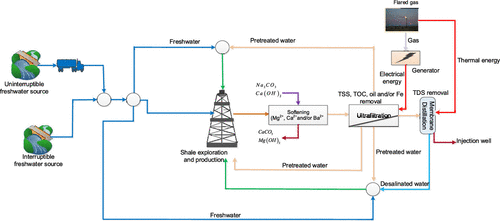当前位置:
X-MOL 学术
›
Ind. Eng. Chem. Res.
›
论文详情
Our official English website, www.x-mol.net, welcomes your
feedback! (Note: you will need to create a separate account there.)
Hybrid Regeneration Network for Flowback Water Management
Industrial & Engineering Chemistry Research ( IF 3.8 ) Pub Date : 2020-06-04 , DOI: 10.1021/acs.iecr.0c01361 Doris Oke 1 , Rajib Mukherjee 2, 3 , Debalina Sengupta 2 , Thokozani Majozi 1 , Mahmoud El-Halwagi 2, 4
Industrial & Engineering Chemistry Research ( IF 3.8 ) Pub Date : 2020-06-04 , DOI: 10.1021/acs.iecr.0c01361 Doris Oke 1 , Rajib Mukherjee 2, 3 , Debalina Sengupta 2 , Thokozani Majozi 1 , Mahmoud El-Halwagi 2, 4
Affiliation

|
As global exploration of shale gas reserves increases, there is a need for an accurate and efficient approach to proper water management, which is one of the vital problems related to shale gas production. This study looks at the effect of using multiple or hybrid treatment technologies in maximizing hydraulic fracturing wastewater reuse while ensuring the sustainability of the process in terms of energy and associated cost. The study considers ultrafiltration and membrane distillation processes as possible pretreatment and desalination technologies for flowback water management. It also considers the possibility of supplying the electrical and thermal energy requirements of these regenerators using flared gas. Two different scenarios are considered based on the flowback water composition in hydraulic fracturing in terms of salinity. Application of the proposed model to a case study leads to a 24.13% reduction in the quantity of water needed for fracturing. In terms of energy requirements, the approach yields a 31.6% reduction in the required thermal energy in membrane distillation and 8.62% in energy requirement for ultrafiltration. For flowback water with moderate total dissolved solid concentration, 93.6% of wastewater reuse comes from pretreated water by ultrafiltration and 6.4% from membrane distillation. However, as the flowback water salinity becomes higher, the percentage of pretreated reusable water reduces to 81.1% and the percentage supply through membrane distillation increases to 18.9%. In all cases, the results indicate that the decision to allow the pretreated water to pass through desalination technology strictly depends on the quantity of water required by a wellpad and the salinity of the wastewater.
中文翻译:

用于回水管理的混合再生网络
随着全球对页岩气储量的勘探不断增加,需要一种准确有效的方法来进行适当的水管理,这是与页岩气生产相关的重要问题之一。这项研究着眼于使用多种或混合处理技术最大化水力压裂废水的回用,同时在能源和相关成本方面确保过程的可持续性。该研究认为超滤和膜蒸馏工艺可能是用于回流水管理的预处理和脱盐技术。它还考虑了使用火炬气满足这些再生器的电能和热能需求的可能性。基于水力压裂中的返排水成分,根据盐度考虑了两种不同的方案。将该模型应用到案例研究中,可以使压裂所需的水量减少24.13%。就能量需求而言,该方法可使膜蒸馏所需的热能减少31.6%,超滤所需的能量减少8.62%。对于总溶解固体浓度适中的回流水,废水再利用的93.6%来自超滤预处理水,而膜蒸馏则占6.4%。但是,随着回流水盐度的升高,预处理的可重复使用水的百分比降低到81.1%,而通过膜蒸馏的供给百分比增加到18.9%。在所有情况下,
更新日期:2020-07-22
中文翻译:

用于回水管理的混合再生网络
随着全球对页岩气储量的勘探不断增加,需要一种准确有效的方法来进行适当的水管理,这是与页岩气生产相关的重要问题之一。这项研究着眼于使用多种或混合处理技术最大化水力压裂废水的回用,同时在能源和相关成本方面确保过程的可持续性。该研究认为超滤和膜蒸馏工艺可能是用于回流水管理的预处理和脱盐技术。它还考虑了使用火炬气满足这些再生器的电能和热能需求的可能性。基于水力压裂中的返排水成分,根据盐度考虑了两种不同的方案。将该模型应用到案例研究中,可以使压裂所需的水量减少24.13%。就能量需求而言,该方法可使膜蒸馏所需的热能减少31.6%,超滤所需的能量减少8.62%。对于总溶解固体浓度适中的回流水,废水再利用的93.6%来自超滤预处理水,而膜蒸馏则占6.4%。但是,随着回流水盐度的升高,预处理的可重复使用水的百分比降低到81.1%,而通过膜蒸馏的供给百分比增加到18.9%。在所有情况下,











































 京公网安备 11010802027423号
京公网安备 11010802027423号